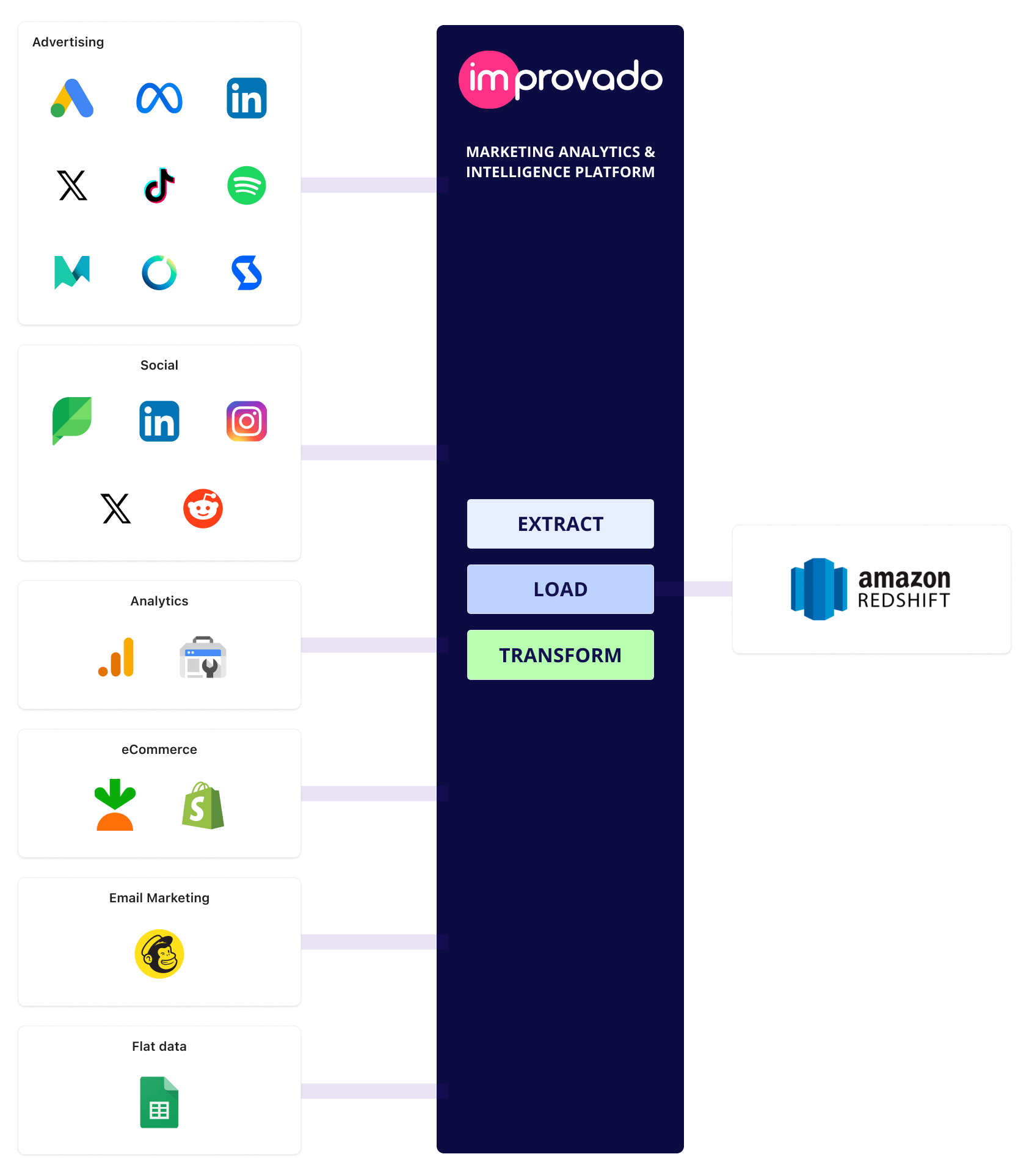.png)
Faster report preparation
Instead of a monthly cadence
To manage data from 10 global clients simultaneously
Faster report preparation
Instead of a monthly cadence
To manage data from 10 global clients simultaneously
Signal Theory is an independent branding and design firm grounded in behavioral science. The firm has clients across the globe including John Deere; BOSE; Michelin North America; RTX Corporation; International® Truck; IC Bus; SONIC®, America’s Drive-In; Chili’s® Grill & Bar; and American Pecan Promotion Board.
Signal Theory is a full-service advertising agency that delivers a wide range of services, from brand development and creative strategy to media planning and analytics. With over 100 professionals across media, strategy, creative, PR, and project management teams, the agency serves three dozen large clients.
However, Shayna Tyler is the firm’s sole analyst, managing all client reporting, including everything from routine updates to custom projects.
This success story showcases how Signal Theory streamlined its reporting and scaled client insights—all without growing its headcount.
Although Signal Theory’s Data Insights department is relatively new, the firm's approach to data is highly mature. The team believes every initiative should be measured to gauge success or pinpoint areas for improvement.
In 2021, Signal Theory relied on a popular marketing analytics platform for client reporting. However, as the agency grew, the platform’s shortcomings became increasingly apparent:
As Signal Theory sought to scale its data capabilities and provide better visualizations to internal teams and clients, the firm began exploring its options.
When Signal Theory decided to move on from its legacy analytics platform, the team briefly explored other well-known tools on the market. However, those options were quickly ruled out, as none could match the features and flexibility they needed. Improvado stood out as the obvious choice from the start, with features and flexibility that addressed the agency’s key requirements with ease.
Improvado’s wide range of connectors—including the much-needed GA4—was a game-changer. Improvado also simplified the process of merging data from various sources and solved a major bottleneck that had been too cumbersome in the agency’s previous platform.
Signal Theory relies entirely on Improvado to connect to its diverse data sources and fuel its data reporting. Their data pipeline flows seamlessly: Improvado aggregates data from multiple platforms, sends it to Amazon Redshift for storage and processing, and ultimately channels it to Tableau for visualization.
At the heart of this system is Improvado’s Data Transformation functionality, which enables Signal Theory to efficiently organize data by segmenting client accounts into workbooks and export jobs. This process structures data into client-specific tables in the warehouse, making it easy to transition into Tableau for dashboard creation tailored to internal and client needs.

Frequently used APIs include GA4, Google Ads, Meta (organic and paid), TikTok, and Sprout Social. Recent expansions include eCommerce platforms like Amazon and Instacart. For unique or manual data sources, such as Catalina or AdAdapted, they leverage flat-file imports and email ingestions, ensuring no valuable data is left behind.
Automation is a game-changer that helped Signal Theory succeed. Dashboards are set to update daily so teams can access the latest data without manual intervention or submitting requests. This constant cycle—from Improvado to the data warehouse and finally to Tableau—reduces time spent on repetitive tasks and ensures consistency across reports.
The transition from Signal Theory’s previous platform to Improvado took about six months. Once the migration was complete, the agency immediately began reaping the new system's benefits.
Improvado has been instrumental in strengthening Signal Theory’s data-driven approach. The agency now uses data more effectively to guide strategic decisions and has started reporting on its internal efforts as well.
Before Improvado, preparing reports was a labor-intensive process, often taking four hours or more for a single report. The switch to Improvado has drastically reduced that time by over 80%, making reporting far more efficient and less stressful.
For most clients, the reporting process is now fully automated, taking 30 minutes to an hour at most. For clients with unique data sources requiring manual input, the system is flexible enough to accommodate specific needs without compromising overall efficiency.
Signal Theory has transformed its reporting capabilities, enabling the agency to serve more clients and deliver better insights—all with a small analytics team.
One of the standout improvements has been the shift from quarterly and monthly reporting to weekly reporting for many clients. Moreover, the team notes that handling daily or even hourly reports wouldn’t be a challenge as long as the data sources are commonplace. This streamlined setup keeps Signal Theory ready to meet the growing demands of data-intensive industries like retail and eCommerce.
Improvado has positioned Signal Theory to unlock new business opportunities and empowered the Data Insights department to work closely with client teams to expand data access and uncover untapped areas for insights. These initiatives are paving the way for increased growth and broader client engagement in the future.
The enhanced reporting capabilities have also proven valuable in client negotiations. By showcasing the breadth and depth of their analytics, Signal Theory has successfully integrated these capabilities into their Statements of Work, reinforcing their value to existing clients.
Since implementing Improvado, Signal Theory’s Data Insights department has seen a remarkable boost in efficiency and collaboration. Colleagues consistently share positive feedback, impressed by the faster delivery of data reports and the streamlined workflows now powering their processes.
The time saved has not only benefited individual productivity; it has also strengthened collaboration across teams. By freeing up time from manual tasks, the analyst has been able to work more closely with other departments, fostering stronger internal relationships and alignment.

Signal Theory is an independent branding and design firm grounded in behavioral science. The firm has clients across the globe including John Deere; BOSE; Michelin North America; RTX Corporation; International® Truck; IC Bus; SONIC®, America’s Drive-In; Chili’s® Grill & Bar; and American Pecan Promotion Board.
https://www.signaltheory.com/Signal Theory is a full-service advertising agency that delivers a wide range of services, from brand development and creative strategy to media planning and analytics. With over 100 professionals across media, strategy, creative, PR, and project management teams, the agency serves three dozen large clients.
However, Shayna Tyler is the firm’s sole analyst, managing all client reporting, including everything from routine updates to custom projects.
This success story showcases how Signal Theory streamlined its reporting and scaled client insights—all without growing its headcount.
Although Signal Theory’s Data Insights department is relatively new, the firm's approach to data is highly mature. The team believes every initiative should be measured to gauge success or pinpoint areas for improvement.
In 2021, Signal Theory relied on a popular marketing analytics platform for client reporting. However, as the agency grew, the platform’s shortcomings became increasingly apparent:
As Signal Theory sought to scale its data capabilities and provide better visualizations to internal teams and clients, the firm began exploring its options.
When Signal Theory decided to move on from its legacy analytics platform, the team briefly explored other well-known tools on the market. However, those options were quickly ruled out, as none could match the features and flexibility they needed. Improvado stood out as the obvious choice from the start, with features and flexibility that addressed the agency’s key requirements with ease.
Improvado’s wide range of connectors—including the much-needed GA4—was a game-changer. Improvado also simplified the process of merging data from various sources and solved a major bottleneck that had been too cumbersome in the agency’s previous platform.
Signal Theory relies entirely on Improvado to connect to its diverse data sources and fuel its data reporting. Their data pipeline flows seamlessly: Improvado aggregates data from multiple platforms, sends it to Amazon Redshift for storage and processing, and ultimately channels it to Tableau for visualization.
At the heart of this system is Improvado’s Data Transformation functionality, which enables Signal Theory to efficiently organize data by segmenting client accounts into workbooks and export jobs. This process structures data into client-specific tables in the warehouse, making it easy to transition into Tableau for dashboard creation tailored to internal and client needs.

Frequently used APIs include GA4, Google Ads, Meta (organic and paid), TikTok, and Sprout Social. Recent expansions include eCommerce platforms like Amazon and Instacart. For unique or manual data sources, such as Catalina or AdAdapted, they leverage flat-file imports and email ingestions, ensuring no valuable data is left behind.
Automation is a game-changer that helped Signal Theory succeed. Dashboards are set to update daily so teams can access the latest data without manual intervention or submitting requests. This constant cycle—from Improvado to the data warehouse and finally to Tableau—reduces time spent on repetitive tasks and ensures consistency across reports.
The transition from Signal Theory’s previous platform to Improvado took about six months. Once the migration was complete, the agency immediately began reaping the new system's benefits.
Improvado has been instrumental in strengthening Signal Theory’s data-driven approach. The agency now uses data more effectively to guide strategic decisions and has started reporting on its internal efforts as well.
Before Improvado, preparing reports was a labor-intensive process, often taking four hours or more for a single report. The switch to Improvado has drastically reduced that time by over 80%, making reporting far more efficient and less stressful.
For most clients, the reporting process is now fully automated, taking 30 minutes to an hour at most. For clients with unique data sources requiring manual input, the system is flexible enough to accommodate specific needs without compromising overall efficiency.
Signal Theory has transformed its reporting capabilities, enabling the agency to serve more clients and deliver better insights—all with a small analytics team.
One of the standout improvements has been the shift from quarterly and monthly reporting to weekly reporting for many clients. Moreover, the team notes that handling daily or even hourly reports wouldn’t be a challenge as long as the data sources are commonplace. This streamlined setup keeps Signal Theory ready to meet the growing demands of data-intensive industries like retail and eCommerce.
Improvado has positioned Signal Theory to unlock new business opportunities and empowered the Data Insights department to work closely with client teams to expand data access and uncover untapped areas for insights. These initiatives are paving the way for increased growth and broader client engagement in the future.
The enhanced reporting capabilities have also proven valuable in client negotiations. By showcasing the breadth and depth of their analytics, Signal Theory has successfully integrated these capabilities into their Statements of Work, reinforcing their value to existing clients.
Since implementing Improvado, Signal Theory’s Data Insights department has seen a remarkable boost in efficiency and collaboration. Colleagues consistently share positive feedback, impressed by the faster delivery of data reports and the streamlined workflows now powering their processes.
The time saved has not only benefited individual productivity; it has also strengthened collaboration across teams. By freeing up time from manual tasks, the analyst has been able to work more closely with other departments, fostering stronger internal relationships and alignment.